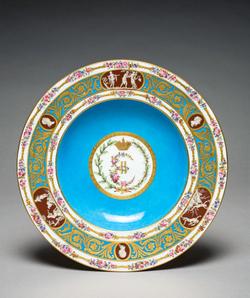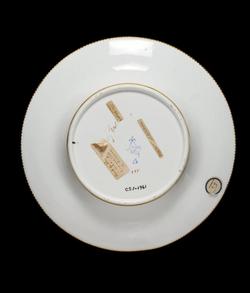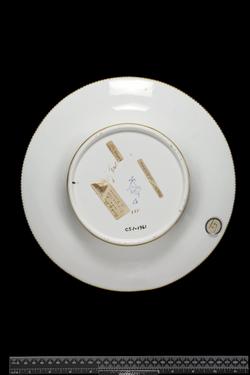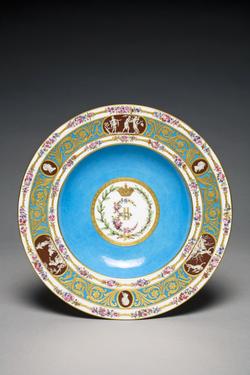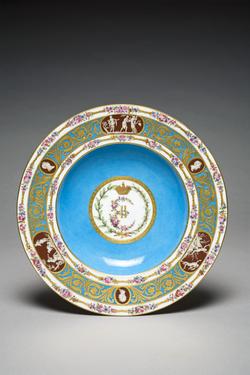Current Location: Gallery 26 (Lower Marlay)
Titles
Plate from the Empress Catherine Service
Maker(s)
Factory:
Sèvres Porcelain Manufactory
Painter:
Dodin, Charles Nicolas
Painter:
Nicquet
Gilder:
Boulanger, Jean-Pierre, père
Entities
-
Plate
- Factory name: assiette
- Category: service ware
Categories
Description
Soft-paste porcelain plate from the Empress Catherine Service, decorated with a bleu céleste ground, 'E II', flowers, and imitation cameos painted in enamels, and lavishly gilt
Soft-paste porcelain decorated with a turquoise (bleu céleste) ground, painting in blue, green, pink, red, and dark reddish-brown enamels, transfer-printed cameo heads painted in reddish-brown enamel, and chased gilding. Circular with a wide rim, and deep well, standing on a fooring with a suspension hole. The dish is heavy for its size. The well has a turquoise (bleu céleste) ground with a central circular reserve framed by a chased gold band. Within it is a wreath made up of branches of laurel and myrtle, tied with a gold bow at the bottom. At the top the branches meet on either side of a gold Imperial crown. Within the wreath is a large script E made up of pink and blue flowers in monogram with 'II' in gold, for Ekaterina II. The rim has white inner and outer borders decorated with small floral sprays separated by husks. Beween them is a broad turquoise band decorated with finely tooled gold foliated scrolls, interupted by three small oval reserves and three larger horizontal oval reserves, each painted en grisaille on a reddish-brown ground to imitate cameos. The small reserves enclose profile heads, respectively of a young woman, a young man, and Pan. The larger reserves enclose mythological scenes from Ovid's Metamorphoses: Apollo and Daphne from Book 1; The competition between Apollo and Marsyas, and the Flaying of Marsyas from Book 6. There is a gold band round the edge, dentilated on the reverse, and a wide gold band round the outer edge of the footring.
Notes
History note: William Ward (1817-85) 1st Earl of Dudley; sold Christie's, 21 May 1886, Catalogue of the Splendid Collection formed by the Right Honourable the late Earl of Dudley from the most celebrated cabinets which have been dispersed during the last fifty years which (by order of the Executors), lot 95, 108 guineas. D.M. Currie; Mrs Alistair Currie, sold Christie's, 13 June 1946, Catalogue of Old French Furniture and Sèvres Porcelain . .. p. 7,, lot 55 sold for 78 guineas to F. Partridge for L.C.G. Clarke, MA, Leckhampton, Cambridge (1881-1960).
Legal notes
L.C.G. Clarke Bequest, 1960
Measurements and weight
Diameter: 26.6 cm
Height: 4 cm
Acquisition and important dates
Method of acquisition: Bequeathed
(1961-04-27)
by
Clarke, Louis Colville Gray
Dating
18th Century, Late
Louis XVI
Production date:
AD 1778
: the plate bears the date letter for 1778
Note
The designs for the service are in the Cabinet des Estampes de la Bibliothèque nationale, Paris, 'Dessins et devis au Service de porcelaine pour l'impératrice de Russie' (B.N., Lf 8 petit folio.)
This is one of 288 plates from a dinner and dessert service of 797 pieces made for the Empress Catherine the Great of Russia (1729-96), which was ordered in 1776, and was despatched to St Petersburg in June 1779. The service was remarkable for its immense size, and the speed with which it was made. It was the first wholly neoclassical service to be made at Sèvres, and the forms were specially designed for it, the plates for example having smooth instead of lobed rims. The use of illusionistic cameos in the decoration reflected the Empress's interest in this aspect of antique art, and innovatory techniques were used to produce them. The outlines of those on the plates were transfer-printed before painting, a technique not normally employed on Sèvres porcelain. For descriptions of the service, see Savill (1988), Dawson (1994), and Peters ( 2005, III). The Fitzwilliam Museum also owns a jug from the service, C.47-1961.
School or Style
Neoclassical
People, subjects and objects depicted
Components of the work
Decoration
composed of
enamels
( blue, green, pink, red, and reddish-brown)
gold
Materials used in production
Soft-paste porcelain
Techniques used in production
Moulding
: Soft-paste porcelain decorated with a turquoise (bleu céleste) ground, painted in blue, green, pink, red, and reddish-brown enamels, transfer-printed cameo heads painted in reddish-brown enamel, and chased gilding.
Lead-glazing
Inscription or legends present
- Text: 33
- Location: On base
- Method of creation: Incised
- Type: Incised mark
- Text: interlaced Ls enclosing aa
- Location: On base
- Method of creation: Painted in bluish-violet enamel
- Type: Mark
- Text: K
- Location: On base above the factory mark
- Method of creation: Painted in violet enamel
- Type: Painter's mark
- Text: nq
- Location: On base below factory mark
- Method of creation: Painted in violet enamel
- Type: Painter's mark
Inscription present: with a curved upright stroke
- Text: script B
- Location: On base below the other marks
- Method of creation: Painted in brighter blue
- Type: Gilder's mark
- Text: H P
- Location: On base
- Method of creation: Painted in red enamel which has partly worn away
- Type: Mark
- Text: illegible
- Location: On base
- Method of creation: Hand-written probably in black ink
- Type: Inscription
Inscription present: narrow rectangular label
- Text: 'From Lord Dudley's Collection'
- Location: On base
- Method of creation: Printed in black
- Type: Label
Inscription present: circular label printed round the edge with a narrow blue band and a wider blue band
- Text: 55 underlined
- Location: On base
- Method of creation: Hand-written in black crayon
- Type: Label
Inscription present: rectangular with the left end torn off
- Text: (S) EVRES printed 'Niquet & Dodin/Date/1778' hand-written
- Location: On the base
- Method of creation: Printed in black and hand-written in faded black ink
- Type: Label
Inscription present: rectangular with part of the right side torn off
- Text: Part of the service/made for the/Empress Cath...../of Russia
- Location: On the base
- Method of creation: Hand-written in black ink
- Type: Label
References and bibliographic entries
-
Catalogue of/the Splendid Collection formed by the Right Honourable the late Earl of Dudley from the most celebrated cabinets which have been dispersed during the last fifty years which (by order of the Executors),Will be sold by Auction by Messrs. Christie, Manson & Woods at their Great Rooms 8 King Street, St James’s Square
-
Louis Clarke as a Collector
page(s): p. 381
-
Earth and Fire
page(s): 29
-
Treasures of the Fitzwilliam Museum
page(s): 162
-
Les Grands Services de Sèvres
page(s): 36
-
Versailles et les Tables Royales en Europe XVIIème - XIXème siècles
page(s): 322-7
-
Sèvres Plates and Services of the 18th Century
page(s): 601-06
-
Musée de l’Ermitage, La porcelaine de Sèvres du XVIII siècle, Catalogue de la Collection
page(s): 130-52
-
The Soft Porcelain of Sèvres
-
La Manufacture de Porcelaine de Sèvres
page(s): 88-9, 91
-
European Ceramic Art
-
Sèvres, Le XVIIIe Siècle
page(s): 217-18
-
Les Marques de Sèvres
page(s): 33
-
The James A. de Rothschild Collection at Waddesdon Manor, Sèvres Porcelain
page(s): 323-4, 317-1
-
Sèvres
page(s): 18-19
-
French Pottery and Porcelains
page(s): 295
-
Sèvres des Origines à nos Jours
page(s): 198-9
-
Sèvres Artists and their Sources I: Paintings and Drawings
page(s): 667
-
Continental Porcelain
page(s): 6
-
Important Italian Maiolica and Continental Pottery and Porcelain
page(s): 8
-
La porcelaine française du XVIIIe siècle dans les musées Nord-Pas-de-Calais
page(s): 128
-
A thing of Beauty is a Joy For Ever. Vincennes and Sèvres Porcelain from a Private Collection
-
The Wallace Collection, Catalogue of Sèvres Porcelain
page(s): 762-82
-
French Porcelain, A Catalogue of the British Museum Collection
page(s): 141-4
-
Catherine the Great & Classical Imagery: An Analysis of her Sèvres Porcelain Service of 1779
-
Porcelain et Faïence Françaises, Mobilier et Objets d'Art, 8 December 1990
page(s): 24-5
-
Continental and British Ceramics: including Meissen porcelain from Korthaus Collection: properties of the St. Germans 1962 Settlement, the late Robert Clarke
page(s): 87
-
The Sèvres Porcelain Service of Catherine II of Russia: The Truth Concerning Payment
page(s): 48-54
-
Königliches Porzellan aus Frankreich, Sammlerstücke und Service der Manufaktur Vincennes/Sèvres
page(s): 66
-
Treasures of France from the Sun King to the Belle Epoque
-
French Eighteenth-Century Porcelain at the Wadsworth Atheneum, The J. Pierpont Morgan Collection
page(s): 281-3
-
Collection Charles-Otto Zieseniss
page(s): 182-3
-
Russian Works of Art, Fabergé and Icons
page(s): 73
-
500 Ans, Arts Décoratifs Européans
page(s): 23-4
-
Splendeur de la peinture sur porcelaine au XVIIIe siècle, Charles Nicolas Dodin et la Manufacture de Vincennes-Sèvres
page(s): 151-3
Identification numbers
Accession number: C.51-1961
Primary reference Number: 93541
Stable URI
Audit data
Created: Saturday 6 August 2011
Updated: Friday 15 December 2023
Last processed: Thursday 14 August 2025
Associated departments & institutions
Owner or interested party:
The Fitzwilliam Museum
Associated department:
Applied Arts

 IIIF Manifest
IIIF Manifest
